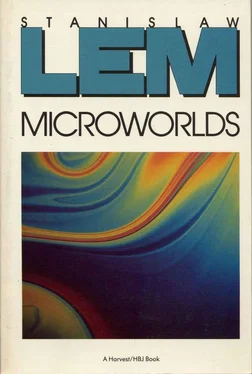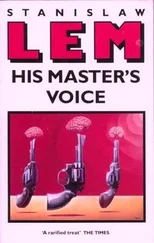For example: in science fiction fandom rumor has it that science fiction is improving every year. If so, why does the average production, the lion’s share of new productions, remain so bad?
Or: we do not lack definitions of this genre. However, we would look in vain for an explanation for the absence of a theoretical, generalizing critique of the genre, and a reason why the weak beginnings of such criticism can be found only in “fanzines,” amateur magazines of very low circulation and small influence (if any at all) on the authors and publishers.
Furthermore: Blish and Knight agree that science-fiction readers cannot distinguish between a high-quality novel and a mediocre one. If they are right, how are readers selected to belong to the public who reads this literary genre, which intends to portray the (fantastically magnified) outstanding achievements of mankind?
The important question is: even if science fiction was born in the gutter, and lived on trash for years on end, why can’t it get rid of the trash for good?
My essay tries to answer these questions. Therefore, it is a “Prolegomenon to Science-Fiction Ecology” — or an “Introduction to a Socioculturally Isolated Realm of Creative Work” — or a “Practical Guide for Survival in the Lower Realm of Literature.” These pompous titles will be justified below. The books by Blish and Knight were of great assistance to me in writing, but I did not regard them as only collections of critiques, but more as ethnological protocols of several explorations into the exotic land of science fiction — i.e., as raw material to be subjected to a sociological analysis. For me, the facts collected by these authors were often more valuable than their opinions; that is to say, I arranged this material in a way not completely corresponding to the spirit of the sources.
I call science fiction a “collective phenomenon” of a sociocultural nature. It has the following parts: (a) the readers — on the one hand, the mute and passive majority of science-fiction consumers; on the other, the active amateur groups that constitute fandom proper; (b) the science-fiction producers — authors (some of them also critics) and publishers of magazines and books.
Science fiction is a “very special case” because it belongs to two distinct spheres of culture: the “Lower Realm,” or Realm of Trivial Literature, and the “Upper Realm,” or Realm of Mainstream Literature. To the Lower Realm belong the crime novel, the Western, the pseudo-historical novel, the sports novel, and the erotico-sentimental stories about certain locations, such as doctor-nurse romances, millionaire-and-the-playgirl stories, and so on. I’d like to spare the reader a detailed description of what I mean by mainstream. Perhaps it will suffice to quote the names of some of the authors who inhabit this Olympus: Moravia, Koestler, Joyce, Butor, Sartre, Grass, Mailer, Borges, Calvino, Malamud, Sarrault, Pinget, Greene.
It cannot be maintained with universal validity that these authors do not descend to the lower floors occasionally, for we know of crime novels by Graham Greene, “fantastic” novels by Orwell and Werfel, and Moravia’s “fantasies.” Some texts by Calvino are even considered science fiction. Therefore it should not be conceived that the difference between authors of the Upper and Lower Realms is that one of the first does not write fantasy or other literature related to science fiction, while one of the second does just this: the difference can be examined according to neither intrinsic type nor the artistic quality of a single work. To be a subject of the Lower or Upper Realm does not only and exclusively depend upon the product made by the author. There are much more complicated interrelationships of a sociocultural nature. I will talk about them a little later.
At this point I want only to propose a practical rule of procedure, which will predict with ninety-eight percent accuracy whether an author will be considered as an inhabitant of the Upper or the Lower floor. The rule is simple and can be stated as follows: if someone starts to write in the mainstream, and the public and critics get to know him by name, or even as a world celebrity (so that, on hearing the name, they know that they are talking about a writer, not an athlete or actor, so his attempts at science fiction and/or fantasy are regarded as “excursions” or “side leaps,” even if repeated) then that man lives on the Upper floor. For instance, the “entertainments” of Graham Greene express a private mood or tactic of his.
During H. G. Wells’s working life, there was no such clear-cut border between these two realms of literature. They shaded into each other gradually and continually. At that time Wells was known simply as an English writer, and the readers who appreciated his prose often knew of both his ambitions — the realistic and the fantastic. Only much later did an Iron Curtain descend between these two kinds of literature so that the typical science-fiction fan often knows the works of science fiction written by Wells, but ignores the fact that Wells also wrote “normal” realistic prose (and highbrow connoisseurs value it highly today, and more so than his science fiction). This curtain, this concrete ceiling (to maintain the image of a two-story building), has grown little by little, and this ceiling, hermetically sealed, became an impenetrable barrier only during the twenties. We can recognize this by the fact that Capek’s works are still classed with the literature of the Upper Realm, while Stapledon, who was writing about ten years later, is not accredited with being there. Therefore some authors do not earn their classifications exclusively on their merits. On the contrary, their works are subject to higher rules of taxonomy, rules that have developed in the course of history and know no exceptions.
If, in spite of all this, a classificatory exception is made, the judgment is given that the (literary) case under consideration is not essentially science fiction, but wholly “normal” literature, which the author intentionally camouflaged as science fiction. However, if we proceed by disregarding all these “extenuating circumstances,” some novels by Dostoevsky become “crime novels,” though in fact they are not regarded as such. The experts say that the plot of a crime novel served the author only as a means to an end, and he definitely did not want to write a crime novel. This is the same situation as is the case of a brothel searched by the police. For simplicity’s sake the nameless, ordinary guests are regarded as customers of the prostitutes, but a prince or a politician defends his presence on the pretext that he descended to these lowest floors of social life because he longed for something exotic, because his fancy took him on such an excursion. In short, such people stay in the land of pestilence as extravagant intruders or even as curious scientists.
The status of trivial literature can be recognized by several typical attributes.
First: its works are read only once, just like the cheapest mass products which are also intended for but a single use. Most of them become obsolete in the same way as mass products do. If crime novels were selected according to their literary merits, it would be superfluous to keep throwing new ones onto the market, because we could find so many good ones among the multitude there already that nobody could read the choicest of them during his lifetime. Still, publishers keep on putting “brand-new” crime novels onto the market even though there are quantities of crime novels of undisputedly better quality that have sunk into oblivion. The same goes for refrigerators and cars: it is a well-known fact that today’s models are not necessarily better, technologically, than those of yesteryear. But in order to keep going, the machinery of production must put new models on the market, and advertising exerts pressure on the consumers to make them believe that only the current year’s models have the best quality. The dogma of continual change of models becomes a law of the market, although every specialist can distinguish clearly between fictitious obsolescence of the product and authentic technological obsolescence. Off and on there are real improvements in technological products. More often, change is dictated only by fashion, a dictatorship in the interest of profit by supplying new goods.
Читать дальше












